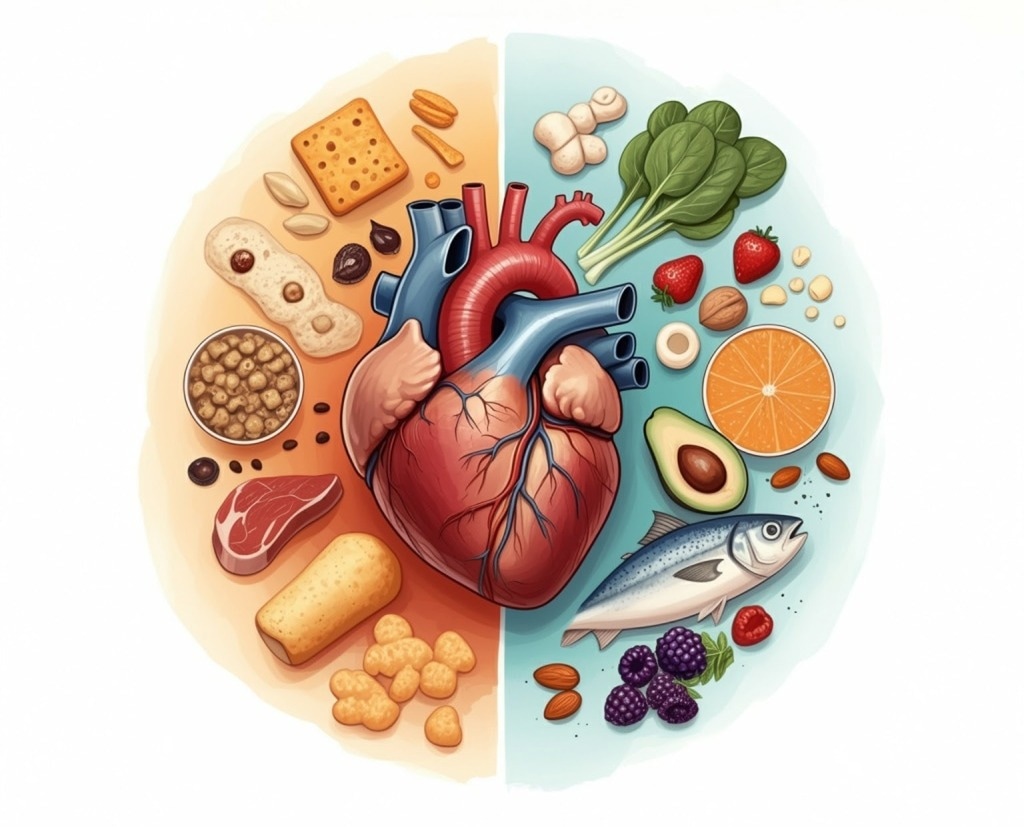New study links pro-inflammatory diets to increased mortality in heart disease patients, highlighting the critical role of diet in managing inflammation and improving survival rates.
Study: Association between dietary inflammatory index and all-cause mortality risk in adults with coronary heart disease in the United States. Image Credit: Shutterstock AI / Shutterstock.com
A recent study published in Scientific Reports examines the association between dietary inflammation and coronary heart disease (CHD).
Dietary inflammation and CHD
Several lifestyle factors including smoking, drinking, and inadequate physical activity contribute to cardiovascular disease (CVD). Poor diet has also been implicated in the development of CVD, which has led many prevention guidelines to emphasize the importance of healthy eating patterns based on evidence generated from randomized controlled trials (RCTs).
CHD is more likely to progress and cause death in the presence of chronic low-grade inflammation, which can arise due to overeating, a sedentary lifestyle, and aging. Low-grade inflammation promotes atherosclerosis, plaque instability, plaque rupture, vascular remodeling, and recurrent stenosis in a dose-dependent manner.
The dietary inflammation index (DII), which was originally developed at the University of South Carolina, is based on 1,943 studies conducted between 1950 and 2010. DII was developed by analyzing and scoring the impact of 45 dietary components on six inflammatory markers. Currently, DII is widely used to elucidate the association between inflammation and chronic disease.
About the study
The current study included data on 1,303 patients who participated in the National Health and Nutrition Examination Survey (NHANES) between 2003 and 2018. About 34% of the study cohort were females, with the mean age of 67 years. The median follow-up period was 77 months.
Deaths from all causes were explored for their association with the content of pro-inflammatory foods in the diet. Stratified analyses were performed across demographic groups.
Correlations between DII and CHD mortality
Of the 1,303 patients with CHD, 536 died of various causes. DII was higher in the mortality group, with a larger proportion of deceased study participants consuming a pro-inflammatory diet.
DII was plotted both as a continuous and categorical variable at less than and greater than zero, respectively. The relationship between mortality and both continuous and categorical DII were compared to determine the robustness of this potential association.
In the unadjusted model, as well as after adjusting for age, race, and sex, higher DII increased the risk of death by 6% and 9%, respectively. In the fully adjusted model, after compensating for confounding factors, higher DII was associated with a 6% increase in all-cause mortality.
With the categorical variable, DII less than zero was considered the reference value. Any DII above zero increased the risk of mortality by over 50%, whereas the fully adjusted model indicated a 41% increased mortality risk. This association was non-linear.
Female study participants were at a greater risk of mortality due to an increased DII, whereas the risk was 145% higher as compared to controls.
Possible explanations
CHD is a chronic inflammatory condition that arises due to various factors including overeating and a sedentary lifestyle. CHD can also be considered a manifestation of systemic atherosclerosis.
The slow narrowing of blood vessels causes hypoxia, ischemia, and death of the heart tissue. These pathological processes are accompanied by the release of multiple inflammatory molecules including high-sensitivity C-reactive protein (CRP), interleukin 6 (IL-6), IL-8, and IL-1β.
The role of inflammation in CHD has been confirmed in multiple studies. In fact, anti-inflammatory diets rich in fresh fruit and vegetables, nuts, fish, vitamins and minerals, as well as fiber, have been associated with a reduced mortality risk among patients with CHD. Conversely, the risk of CHD is higher in individuals who consumed red meat, eggs, processed meat, and sugars.
Conclusions
In the current study, CHD patients who died of all causes had higher DII scores than the survivors. The risk of death from any cause in a CHD patient was 41% higher if the individual consumed a pro-inflammatory diet as compared to those consuming anti-inflammatory foods.
Previous studies have reported an increased risk of CHD with inflammation and higher DII scores. However, the current study is the first to correlate dietary inflammation with all-cause mortality.
Given the strong association between DII and CHD, dietary management of inflammation appears to be central to the secondary prevention and treatment of this condition, particularly among females. Thus, clinicians should assess DII and educate their patients on the importance of consuming a sustainable, balanced, and high-quality diet to attain a better quality of life.
Journal reference:
- Wang, E., Fang, C., Zhang, J., et al. (2024). Association between dietary inflammatory index and all-cause mortality risk in adults with coronary heart disease in the United States. Scientific Reports. doi:10.1038/s41598-024-75381-6.
Source link : News-Medica

